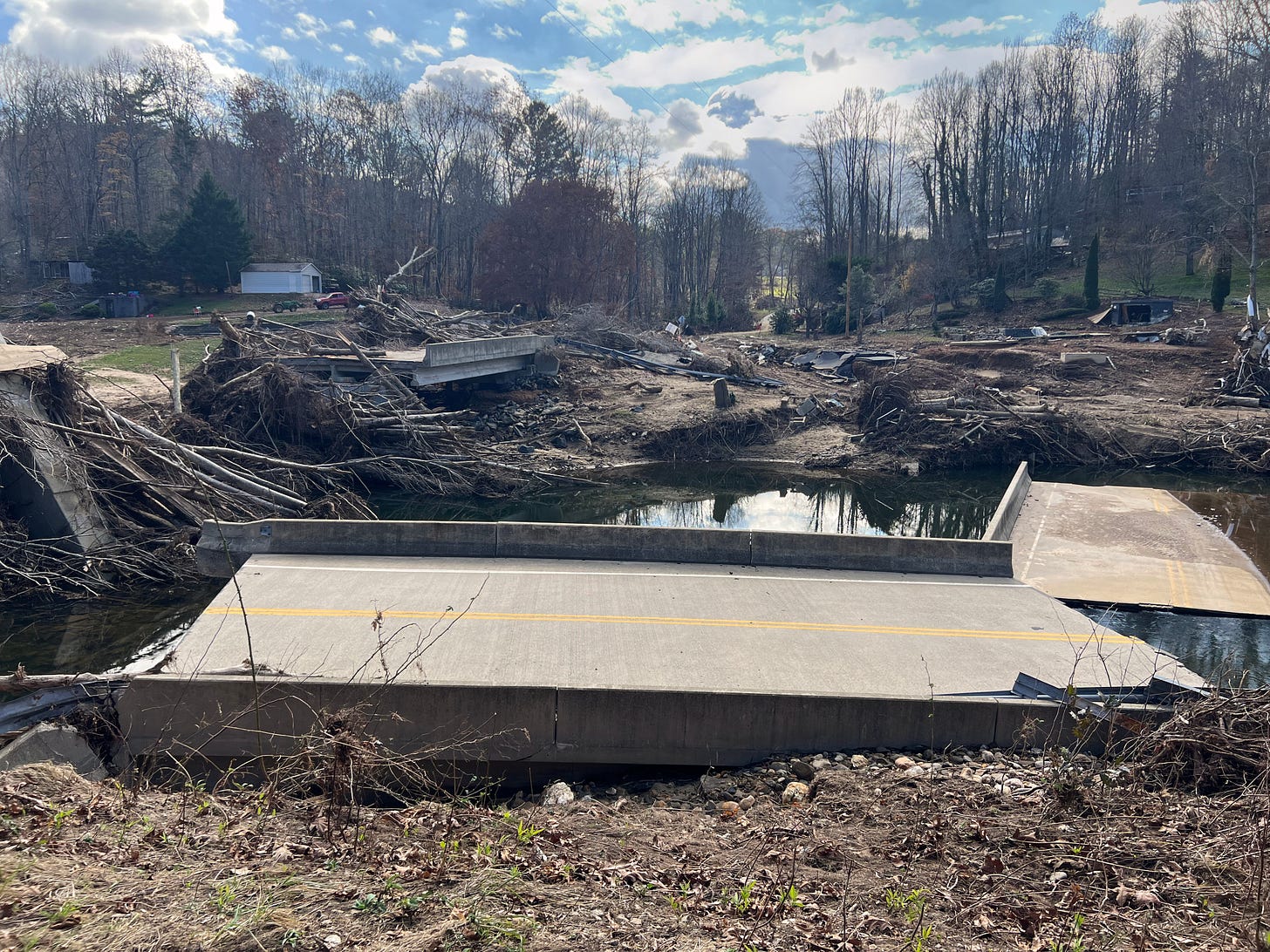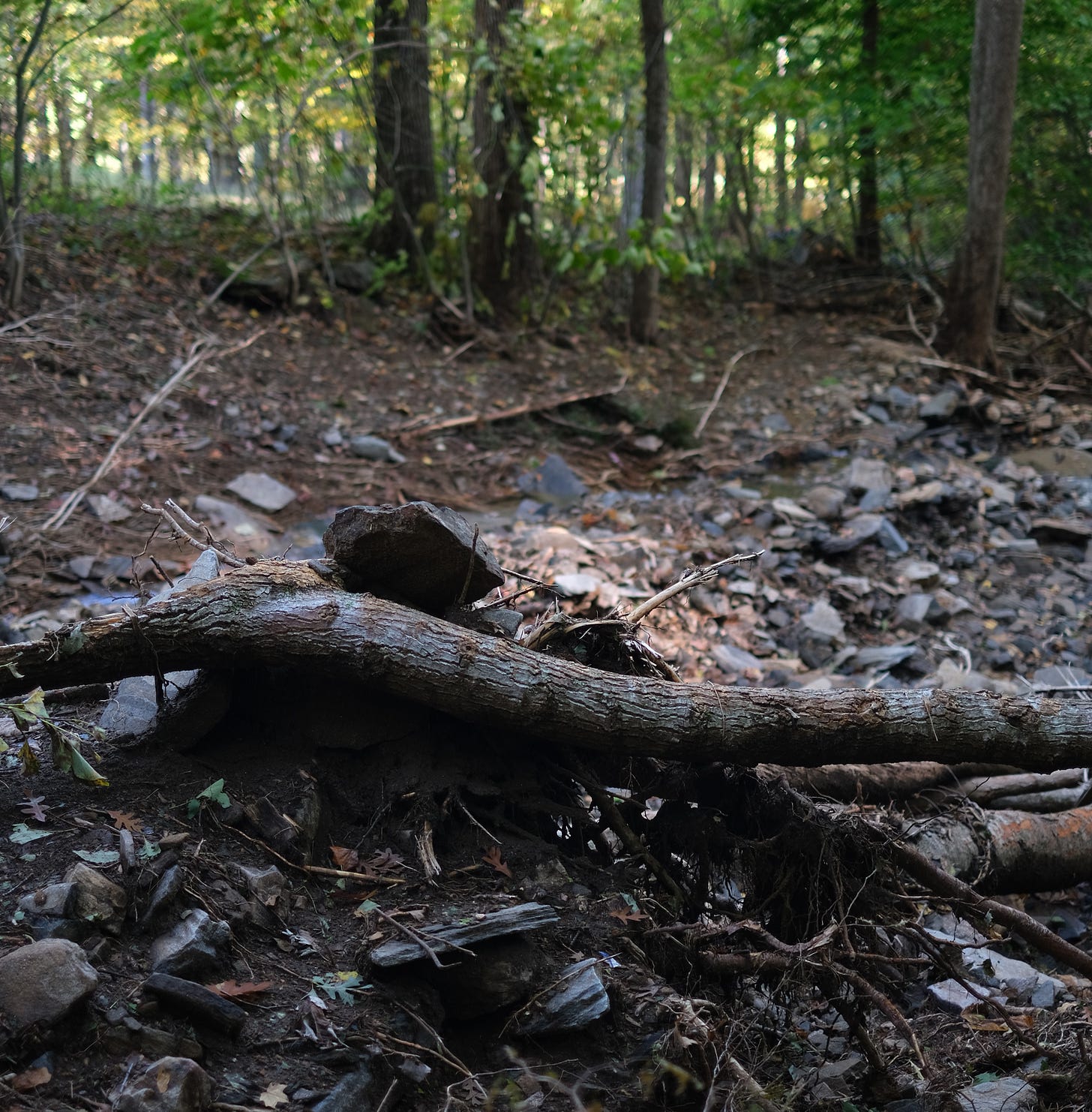Escaping the Underworld
Descending is easy, it's the journey out that's hard
Our car slipped on an icy bridge above a freeway when I was a child. This was the 1980s, when safety was minimal and a flimsy guard rail was all that separated us and the cars below. Our oldsmobile spun wildly, like one of those carnival rides that whips you around until you can’t see straight. I looked out the window at the cars flying below us and noticed that we were inching closer to them with each rotation. Momentum threw me out of my seat and tucked me under the glove compartment. Suddenly all I saw was the darkness of my little cave, shielding my view from what was about to happen. My tiny body involuntarily curled up in a tight ball. I heard my mother’s stern but panicked voice: “relax your muscles. You are less likely to break your bones if your body is relaxed.” I imagined what it would be like to fall onto the freeway below, to feel all my bones break. I wondered if we were about to die and how much it would hurt. I didn’t want it to hurt. I took a deep breath and surrendered to the danger, fully relaxing my body as if my life depended on it. I unclenched my fists, relaxed my shoulders, and softened my whole being. And then our car stopped.
I never bothered to look up the validity of my mother’s claim. I didn’t need to - by the time I was old enough to question it, the advice had already turned into a metaphor that helped me navigate the turmulous years of being a teenager. It instilled a practice of accepting things I could not change, like the embodiment of the quote “let go or be dragged.”
I used this practice when I watched the landslides barrel towards my house this past September. When the electricity was eliminated for an indeterminate amount of time, when our road turned into an impassable river, when the trees fell and landscape as I knew it changed. This was another instance where I was powerless to the circumstance. All I could do was choose how I was going to react. So I relaxed my body (and re-relaxed it when it tensed up again, and again, and again) and relaxed into each tragedy as it came.
Underworld stories are often marked by the descent. Entering is presented as a heroic feat: sometimes a three headed dog must be charmed, sometimes nothingness must be navigated, sometimes you must let go of your entire life as you know it. But entering is the easy part. If the three headed dog eats you instead of letting you pass, you’re still going to end up in the underworld. It may be a more painful way to go but it’ll get you there nonetheless. The downward momentum of a descent ensures that you will reach the bottom at some point, even if you have to fall all the way down.
It’s leaving the underworld that is the real challenge.
𖡼.𖤣𖥧𖡼.𖤣𖥧
It only took a few hours for Appalachia to plunge into its own underworld journey. The hurricane brought over 2,000 landslides to my region, wiping out entire towns between breakfast and lunch. Houses washed away, roads collapsed, people died. The entire ecosystem - humans and beyond - was thrust into a tragedy. We have been navigating the unknown together ever since.
As the seasons turn and life demands we carry on, I’ve been struggling to find a way out of the underworld. Trauma constantly resurfaces. Sometimes it happens when I turn onto a street I haven’t visited since before the hurricane, contrasting how different my memory is from the current reality. I’ll get ready to go on a hike only to realize the trail is gone. The mental maps I’ve referenced for years are now useless. I am in the same location but nothing is where my body thinks it should be. I might as well be floating through space with nothing to root to. Everything is different after spending time in the belly of the earth, where things rot and decompose and ferment - especially your very self. But it only becomes noticeable when you return to where you came from.
Other survivors of natural disasters explained how this was the tricky part: getting back to normal when everything has changed. Many warned me that the derealization after an ecological catastrophe was a slippery slope into substance abuse. It’s so hard to be confronted with this distorted reality every day. Their advice made me determined to get through this without using dangerous coping mechanism to extend my underworld stay. I resolved to witness each horror and relax my entire body.
I decided to climb the path of a landslide that almost killed me.
I set out as the sun rose, realizing I had picked the worst possible day to make my pilgrimage. The air was thick with clouds and mist, making the deep layer of leaf mulch slick and unreliable. It was hard to get my footing. I began walking along the edge of the scar where the damp earth underneath left many treacherous spots with hidden gaps. Each wrong step left my ankle twisted and trapped, feeling like hands were pulling me back downward.
Halfway up, the slope of my hike became much steeper. The air was cold and the ground was icy. I switched from hiking to pulling myself up the steep hill by swinging my body from sapling to sapling, putting full faith in their ability to hold in this environment. Other times I crawled upward through the mud on my hands and knees, frantically looking for something to grasp onto when I would feel myself slip backward. Every few minutes I would stop to catch my breath. I’d cling to a tree while noting that I was totally not prepared for this insane climb and I should turn around. But I was stubborn with this metaphor. I pushed on for hours.
𖡼.𖤣𖥧𖡼.𖤣𖥧
Reaching the ridge was like a miracle. I felt the wind for the first time all morning, blowing from the west previously shielded by the mountain and cooling my sweat. The ridge was narrow and allowed a view down both sides when I stood in the middle. I wondered when the last time a human had visited here. It was peaceful, quiet, secluded, and nothing like the chaotic ascent I had just struggled with.
Part of the ridge was cloaked in an ominous thick cloud. I stumbled over to it, feeling my knees shake as I got closer. When I reached the center, my whole body began to tremor. Was this exhaustion? Fear? I thought about how my breathing would change when I walked the landslide below. My breath would turn into little huffs, heavy exhales like my grief was escaping. I spun around and saw that I was standing inside of a crater-shaped hole lined by a wall of gnarled roots several feet tall. I had arrived at the site of the initial wound.
It was different than I imagined. There was no river around - so the water must have come from even higher up the mountain during the hurricane, choosing to pool at this spot. I sat down and greeted my sadness. The boulders beneath me were nicked and scratched, like someone drew out the story of struggle that took place here. I wondered what it was like for an ancient rock to feel air for the first time in millennia, having layer upon layer of weight released from its shoulders in a single moment.
I inched over to the margin of the scar, touching the landscape that was still intact. The clouds had enveloped everything beyond me. I couldn’t see the way I came up. I teetered on the edge while looking at how far I had to return home, briefly wondering if I could just live up here now instead of going through another struggle. But descending is easy, I reminded myself. It is just a decision of how much to resist on the way down. So I took in one last deep breath of the air at the ridge and gently pushed myself downward through the leaves.
I’ve taken a wild leap into becoming a full time writer. I have no idea what I am doing. It’s time to figure it out.
In preparation for this shift, my art shop has been transformed into a print shop. It is ready to house upcoming zines (like the Poison Garden!) and affordable giclée prints. It even has a cute new logo. You can see it here: spiritdirt.com
To better utilize this platform, I’ve divided my work into two categories: Animism in Appalachia and the Language of Poison. If you are here solely for my ecological tales, you have the option to mute the esoteric poison pieces within the Substack interface - and vice versa. This sets me up to offer you more frequent essays tailored to what you are interested in.
Thank you for being here, ♡︎ Mila









This was deeply felt. Thank you for your vulnerability. Also, thank you for sharing that bit about you leaping into full time writing. This is something I’ve been really contemplating especially lately as it is a deep desire. Your leap is encouraging! Wishing you all the best and grace in this healing process.
so powerful, thank you xx